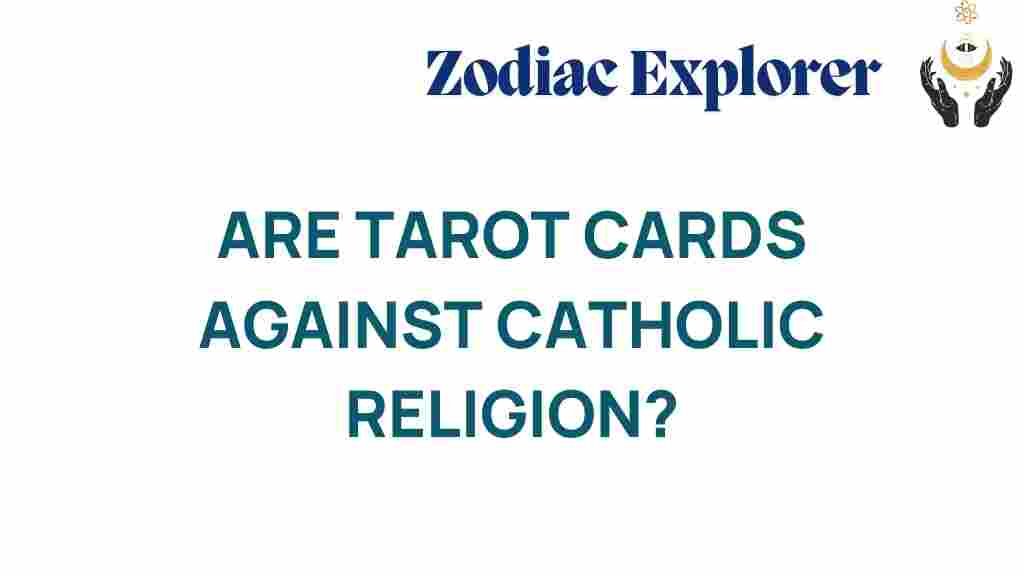Do Tarot Cards Challenge Catholic Beliefs?
The intersection of Tarot cards and the Catholic religion is a topic that often ignites passionate discussions. For many, Tarot cards symbolize spirituality and mysticism, while for others, they represent a challenge to traditional beliefs rooted in faith. In this article, we will explore whether Tarot cards truly challenge Catholic beliefs, examining aspects of divination, symbolism, and the ethical considerations surrounding their use.
Understanding Tarot Cards
Before we dive into the relationship between Tarot cards and Catholic beliefs, it’s essential to understand what Tarot cards are and how they are used.
What Are Tarot Cards?
Tarot cards are a set of 78 cards used for divination and self-reflection. They are divided into two main sections:
- Major Arcana: Comprising 22 cards, these cards represent significant life themes and spiritual lessons, such as The Fool, The Lovers, and The World.
- Minor Arcana: Consisting of 56 cards, these cards are divided into four suits—Cups, Pentacles, Swords, and Wands—each representing different aspects of life.
How Tarot Cards Are Used
People use Tarot cards for various purposes, including:
- Self-Reflection: Many individuals use Tarot as a tool for introspection and personal growth.
- Guidance: Tarot readings can provide insights into current life situations and potential outcomes.
- Spiritual Connection: Some practitioners feel a deeper connection to the universe or their spirituality through Tarot.
Tarot Cards and Catholic Beliefs
Now that we have a foundational understanding of Tarot cards, let’s explore how they interact with Catholic beliefs.
Divination in Catholicism
The Catholic Church has a complex stance on divination practices, which includes Tarot card readings. According to the Catechism of the Catholic Church, divination is considered a sin because it seeks to unveil the future or hidden knowledge through means that are not aligned with God.
- Catechism Reference: The Catechism states that all forms of divination are to be rejected, as they contradict the honor, respect, and love that we owe to God alone.
- Faith and Trust: The Church emphasizes that true knowledge of the future and guidance should come from faith in God, not from cards or mystical practices.
Symbolism in Tarot Cards
Tarot cards are rich in symbolism, with each card carrying deep meanings. While some symbols may resonate with Catholic teachings, others can conflict with them.
- Common Symbols: Cards often feature symbols like angels, the moon, and various archetypes that can be interpreted in multiple ways.
- Interpretation Variance: Interpretations of these symbols can vary widely among practitioners, leading to potential conflicts with Catholic teachings.
Ethics of Using Tarot Cards
When considering the use of Tarot cards, it’s important to reflect on the ethical implications, especially from a Catholic perspective.
Personal Ethics
For individuals who identify with the Catholic faith, using Tarot cards might pose ethical dilemmas:
- Faith vs. Practice: Many Catholics may feel that using Tarot contradicts their faith and could lead to a reliance on something other than God.
- Spiritual Risks: Engaging with Tarot might open individuals up to spiritual confusion or misguidance.
Community Perspective
Within the Catholic community, views on Tarot can vary:
- Supportive Views: Some may see Tarot as a tool for self-reflection and personal growth.
- Opposing Views: Others might argue that it undermines the core tenets of the Catholic faith and promotes reliance on occult practices.
Step-by-Step Exploration of Tarot
If you are a Catholic exploring the world of Tarot cards, it’s essential to approach it thoughtfully. Here’s a step-by-step guide:
Step 1: Educate Yourself
Before engaging with Tarot, learn about its history, symbolism, and practices. This understanding will help you discern its relevance to your beliefs.
Step 2: Reflect on Your Intentions
Consider why you want to use Tarot cards. Are you seeking guidance, self-reflection, or curiosity? Understanding your intentions can clarify whether this practice aligns with your faith.
Step 3: Consult Trusted Sources
Speak with spiritual advisors or clergy within the Catholic Church to understand their views on Tarot and how it relates to spirituality and faith.
Step 4: Approach with Caution
If you decide to use Tarot cards, do so cautiously. Maintain an awareness of your faith and be critical of the messages you receive.
Troubleshooting Common Concerns
Many Catholics may have concerns about using Tarot cards. Here are some common issues and how to address them:
Concern 1: Spiritual Confusion
If you feel confused about your spiritual path while using Tarot, take a step back. Engage in prayer or meditation to reconnect with your faith.
Concern 2: Guilt or Shame
Feelings of guilt can arise after using Tarot. It’s essential to remember that exploring your spirituality is a personal journey. Seek guidance through confession or spiritual direction.
Concern 3: Pressure from Community
If your community disapproves of your interest in Tarot, engage in open conversations. Share your intentions and seek to understand their perspectives while articulating your own.
Conclusion
In conclusion, the relationship between Tarot cards and the Catholic religion is complex. While Tarot cards can offer insights and self-reflection, they also present challenges to traditional Catholic beliefs, especially concerning divination and reliance on symbols that may conflict with faith.
As you navigate this territory, consider your intentions, seek knowledge, and engage with trusted spiritual advisors. Ultimately, your journey in spirituality is personal, and understanding the symbolism and ethics of Tarot can help you determine whether it aligns with your beliefs.
For further reading on spiritual practices, you can check out this informative article. If you’d like to explore more about the Catholic faith, you can visit the official Catholic Church website.
This article is in the category Myths and created by ZodiacExplorer Team
